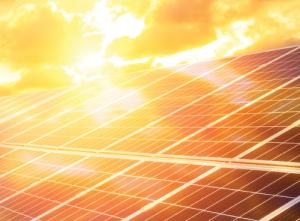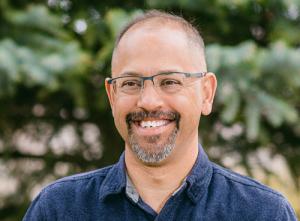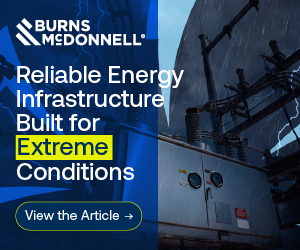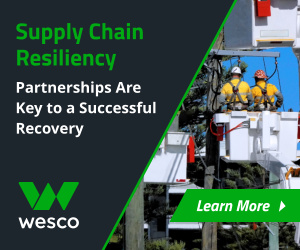Solar Power
Sach Constantine is the executive director of Vote Solar.
Solar energy is seemingly everywhere these days, with regulatory proceedings in abundance and lots of projects lined up. Keeping up with all of that across the United States isn't easy as the journey toward decarbonization continues.

Vote Solar is a nonprofit policy organization advocacy group that wants to make sure no one is left out of that journey, with its mission of making solar energy more accessible and affordable across the United States. It has a North Star, too, of making solar energy ubiquitous.
So far, the organization is operating in twenty-seven states, but is growing. Vote Solar has a new executive director as of May, Sach Constantine, and PUF sat down with him to discuss his leadership goals and more. Listen in.
PUF's Steve Mitnick: You've been named executive director of Vote Solar. How did that come to pass?
Sach Constantine: This has been a great journey for me. I've been here for five years, and when I came to my job, our founding director had been there for fifteen years and now has finished a twenty-year run at Vote Solar.
 Sach Constantine: When you look at the rooftop level, at households, solar is going to become, and this is already happening in places like Germany and Australia, just another appliance.
Sach Constantine: When you look at the rooftop level, at households, solar is going to become, and this is already happening in places like Germany and Australia, just another appliance.
He wanted us to look around corners and think about the future of regulation and policy as it affected solar. I spent five years thinking about that and building our regulatory team. I put that vision forward as we looked for a new executive director, and that resonated with the board and our mission.
So, now I'm the executive director. I'm excited to be here, having had that experience, chance to formulate that vision, and plan for going forward.
With this team, I'm in a great position to grow our impact. I hope that means the solar industry is being set up for success.
PUF: What's a typical day like?
Sach Constantine: The team is spread out. We're in over twenty states. A lot of my day is spent understanding what's going on in each of those regions, the major issues we're facing, the major proceedings or campaigns we're working on.
I spend good parts of my day talking to people like you. Transparency and information work in our favor, so we want to be telling our story as much as possible, whether it's to funders, the press, or to collaborators.
A lot of my job is making sure people understand what Vote Solar is doing, where we're doing it, how and why we're doing it, and that the good work of our teams in all regions and states is getting recognized and needed support.
PUF: Some of the issues you work on, not everybody in the industry agrees with, but you have a way of being collegial in the debates. How does that come to pass?
Sach Constantine: One of the things that brought me here was that collegial edge-of-humor approach to these serious issues. We try to be friendly.
We want to think strategically, we want to evolve our mission, so it matches the pressing needs, but do that in a way that brings people in. We want to do that in a way, which recognizes there are many interests at stake, including utilities, the solar industry, and the energy sector broadly.
But also, frontline communities, communities of color, low-income families, middle-class households, and the industrial base. We've got to have a forum, and an attitude that brings people in, and which isn't about pushing people out.
That's a central part of our mission and our strategy as it's evolving. We went from a technology focused organization to centering on equity, inclusion, and access. What's more accessible than humor?
We want to be yes, sharp on our analysis, but also welcoming and open internally for our staff. It does matter for our staff, but it also matters for our collaborators and even our adversaries. We want them to respect us as much as we respect them and their points.
PUF: There're a lot going on with solar. It's taken off in terms of support, development, and capacity. What's your biggest passion?
Sach Constantine: We have focused on three big aspects going forward. There is an evolution from where we were when solar was an upstart and disruptive technology.
We're on that cusp now of being an incumbent, and a mainstream technology. We're the lowest marginal cost energy out there. What should we be passionate about? There're three things.
One is we've got to stop digging the hole we're in, in terms of climate, and solar is a great replacement for planned new gas that's coming on. We are committed to identifying opportunities in the gas portfolios utilities are planning and replacing them with solar if possible.
Another important issue is we've got to center on equity and access, making sure the clean modern energy grid we're building out benefits every community. One of the unfortunate aspects of the fossil economy — besides devastating climate impacts — has been the exclusion of many communities from choice and agency in that.
Given what solar can do for those communities, it's strategically important for us to center on access and participation, and I feel passionate about that. This passion for access and equity should permeate, and you will see it permeating everything Vote Solar does.
The final piece, which relates to those first two, is we've got to get serious about the portfolio approach. Solar is not a magic bullet.
We know it's got to be paired with storage, demand response, energy efficiency, building electrification, transportation, and electrification, all of the things that we know can help the economy, individual consumers, and the grid in its portfolio.
How do we make that portfolio approach real and possible? How do we put it forward as a viable alternative for regulators who are looking to keep the lights on, maintain resilience and reliability, and bring costs down over the long run?
These are issues regulators care about and should care about. What is great for me is this portfolio approach can displace the capacity and performance of gas and simultaneously help families secure their energy services safely and affordably.
PUF: You were a regulatory director, so you know there're lots of cases. What do you say to the folks who are on the other side?
Sach Constantine: The common ground is what we're searching for. Hopefully, with the approach we take, with the fact-based, solutions-oriented approach, we can convince utilities and regulators there is a viable win, win, win out there.
One of the ways we are trying to drive this home is we've looked at issues like climate or carbon risk as a matter of economic and financial analysis. We're saying to the utilities, you're at environmental risk in terms of the fragility of your system to sea-level rise, or intensity of storms, floods, and fires.
You're at economic risk because your coal and gas plants are out of the money and in danger of becoming stranded assets. You're at regulatory risk because the awareness of climate risk is already in the consciousness of the regulators.
You're at all of these different kinds of risks. What are you going to do about it?
Let us offer some solutions. We have packages that can help you mitigate that risk. They involve solar and storage, and this whole portfolio approach. We want to tell that story, and we want to convince regulators of it.
We're building up a lot of regulatory capacity. We are partnering with folks like Grid Lab, Earth Justice, and Rocky Mountain Institute, people with deep analytical chops, as well as our own analytical chops, on vibrant, clean energy.
We can help from a utility perspective to understand what their risks are, and by elevating the voices of the communities we represent, frontline communities, people traditionally outside of the decision-making process, bring them together and say, there's a solution in here.
Sometimes it feels like beating your head against the wall. But sometimes we get companies like Duke or Xcel to enter into conversations with us. We get companies to recognize there could be a win-win.
I don't want to say we are not a thorn in their side, we are. We try to be frank when we think they're making bad decisions, but if we don't find that common ground, we could miss important solutions, and I don't know that we'll make a lot of progress if that's the case.
PUF: For readers who are not experts on the solar industry, how is the state of the solar industry?
Sach Constantine: The solar industry is very strong. There are some strong incumbent players and a lot of new startups. We have a robust install industry, from small mom-and-pop shops all the way to the big SunPowers, Sunruns, and Teslas of the world. We have the big utility developers also showing their strengths.
This Commerce Department investigation has indeed thrown a wrench and put some existing projects at risk. It has slowed the pipeline. It has virtually brought a standstill to many projects out there. It's largely because of the uncertainty, and the potential punitive nature, the backward reaching penalties that might have an impact.
There's a real issue that the industry has to confront about supply chain integrity and sourcing. Vote Solar encourages the industry to look into that, but what we don't want to see is this indefinite, unending investigation that puts everybody up in the air, as businesses hate uncertainty.
What we need is a quick decision. We need them to just look at the facts, decide what they're going to do, give that signal to the industry, let the industry adjust and adapt, and give the industry the chance to address whatever these issues are.
I have full faith and confidence in the industry to do that. It is a strong and popular industry. Two hundred thirty thousand jobs are associated with it, with massive megawatts coming in. A real driver of our climate solutions.
PUF: You mentioned how there're the big players and then the home install smaller players. How does that work?
Sach Constantine: Solar is a big space. The solar panel, the PV panel that's at the core of all of this, is a flexible resource. It can be put in huge utility-scale installations, or it can be put into very small microgrid or remote applications.
There's room for lots of companies. When you look at the rooftop level, at households, solar is going to become, and this is already happening in places like Germany and Australia, just another appliance. Contractors and electricians will simply come and install or service your solar and battery system like they would a hot-water heater.
The major rooftop installers are going to be out there with their vast marketing apparatus, figuring out where solar can be put on, and they're going to be aggregating that fleet and deploying the capacity like a big generator, as part of their business.
That is fantastic. We need that. We also need the NextEras, and the big developers. We need companies like Nextracker and Trajectory Energy, who are looking for the big opportunities to put a lot of solar onto the grid, hook it up to transmission and distribution systems, and make our system more cost-effective and cleaner.
There's room for all of those. If we're honest, there's sometimes been a tension between them. Those who say, hey, we don't want all those small little distributed, we only want the big ones. Or others who say, no this is about a complete revolution, a complete turning over of the grid. We're all going to go to our remote little corners and supply ourselves.
We don't think that's the right answer. The right answer is a healthy balance that promotes optimal competition.
Through both of those scales of the market interacting, we're going to get an incredible cost savings, a rapid transition to clean energy, and jobs all across the spectrum.
PUF: Look ahead two to four years. Where is this industry going in solar?
Sach Constantine: I alluded to the idea of solar being like a plumber. I want my hot water unit replaced. I want a solar unit on my home. We need to get there through better interconnection processes, labor training, and permitting processes.
We need to drive costs out of permitting, make it easier for folks to go solar, because it should be ubiquitous. I don't know if we'll get there in three to five years, but that's a North Star in terms of the solar industry.
We're also going to have to understand that all-source procurement needs to be ready for a big influx of solar projects. There are hundreds of megawatts, even gigawatts of solar in the pipeline waiting to be developed, but they can't get through interconnection queues.
They're stuck out there. We've got to solve those bottlenecks, whether that's transmission planning, better procurement processes, or better hosting capacity analysis.
Those are two of the biggest barriers. If we achieve those, we have an innovative industry here to get us the rest of the way.
We have an experienced utility sector, folks that are capable of addressing big questions such as, what does comprehensive transmission planning look like? How do we do better distribution system planning? Integrated resource planning to accommodate that solar? We could make great progress.
Four or five years from now, we are going to see solar as part of a package offering. It's going to be combined with storage. It's going to be combined with electrification. It's going to make heat pumps more cost effective. It's going to make charging your car at home more cost effective, and also easier on the grid.
The way we're going to get there is by getting more people into this conversation, getting more problem solvers, more creative thinking from all our communities, leaders, all sectors thinking about these solutions. That's what Vote Solar wants to push for.
That's where solar is headed. Where it's the obvious choice, lowest marginal-cost fuel with a form factor that anybody would be envious of. We can put it in so many places. We don't have to put it in desert settings, because we have cities like Los Angeles and many others with acres of rooftops, warehouses, and data facilities.
PUF: What's the most fun thing about trying to lead this organization and help this industry?
Sach Constantine: The most fun thing is the people in this organization, everyone is deeply committed, and I love working with and learning from them. We've grown, we've almost doubled in size now, and we're growing again.
We're hiring people in regions who have lived experience with these issues. I love managing this team, working with this staff. They're experts. They are passionate. You can't ask for a better leadership position.
I'm also excited about the opportunities to get in front of an audience and engage them on solar deployment centered on equity. I was just speaking a couple of months ago to MBA students at ClimateCAP, the Global MBA Summit on Climate, Capital, & Business. I got to tell future leaders our story, what we are after, what we are doing. I was inspired and impressed with their reactions.
I love that opportunity. When people hear these stories, when they understand enough of the facts, it's super popular but it becomes possible. That's the big reward of this job.




